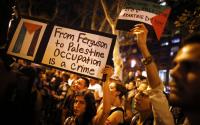1 November 2004The Guardian
The three words that were on everyone's mind did not escape John Kerry's lips when the soaring notes of the gospel choir faded away and he rose before the congregation.
With just 48 hours to go before his fate is decided, and 40 hours after Osama bin Laden made his dramatic entrance into the American election campaign, the Democratic candidate was determined to return to the closing message of his campaign - his promise of better jobs, healthcare and education.
And at Shiloh baptist church, where people fluttered fan-sized Kerry-Edwards signs in the pews, that was what people mostly wanted to hear from Mr Kerry: a commitment to the concerns of African-American voters.
"What are we doing, cutting overtime pay for people trying to work to take care of their families and their kids?" Mr Kerry said, and the congregation umm-hmmed their approval. "I am tired of being a country that is content to spend $50,000 a year to send a young person to prison for the rest of his life rather than invest $10,000 in Head Start [the US, pre-school, child development programme] and other federal education programmes." There was a smattering of applause.
But while the Shiloh baptist church comes pretty close to being Mr Kerry's promised land - the pastor, Reverend Selwyn Bachus, describing the Bush administration as a "nightmare" - it was hard to banish entirely that mix of confusion, dread and anger that bubbled up as the US's most hated enemy resurfaced.
Popular wisdom this weekend held that Bin Laden's reappearance on television was good news for George Bush, reaffirming his image as a resolute leader, a war-time president and safe pair of hands in an age of terror.
But such predictions do not hold much sway over the congregation at Shiloh where the hostility towards President Bush runs so strong and deep almost nothing might persuade people to change their vote.
"The first thought that went through my mind was how come he pops up on TV and we can't find out where he is?" said Alonzo Motley, the church deacon. "I don't think that it is going to help Bush."
That was among the more charitable views of Mr Bush. Among the pews, as among African-Americans countrywide, there is a conviction that Mr Bush rode to power by robbing black people in Florida of their votes, and an abiding sense that he has little empathy for minorities or the poor.
"I really don't know if I should be mad at Osama Bin Laden or mad at George Bush," said Elaine Harris, a church chorister, who lost a cousin in the September 11 attacks. "I feel like the president and Bin Laden have some kind of tie."
Aides for Mr Kerry said yesterday that he had no plans to make a big statement on Bin Laden during his campaign stops. They revealed early internal polls indicating that the Bin Laden video left the race unaltered with Mr Kerry at 48% and Mr Bush at 47%. However, the question in that poll was suggestive, asking respondents whether Bin Laden's resurfacing "makes me think that George Bush took his eye off the ball in Afghanistan and diverted resources to Iraq".
The rationale behind the silence of their candidate was clear: Mr Kerry was not exposing himself to accusations that he was capitalising on the surprise appearance by America's most dreaded enemy.
So far, Mr Kerry has restricted his comments to a well-worn campaign theme, saying Mr Bush neglected the hunt for al-Qaida's leader through obsession with Iraq.
"When Osama bin Laden and al-Qaida were cornered in the mountains of Tora Bora, it was wrong to outsource the job of capturing them to Afghan warlords," he told a rally in Wisconsin on Saturday. "It was wrong to divert our forces from Afghanistan so we could rush to war with Iraq without a plan to win the peace."
By yesterday Mr Kerry was the statesman again, preaching unity, telling ABC TV that he was dismayed that Democratic leaders had sought to extract political advantage from Bin Laden's appearance. "I'm outraged that he has appeared; I'm outraged that he inserts himself in any kind of way into the electoral process of America," he said.
Yesterday was the fifth time in as many weeks that Mr Kerry had chosen to spend his Sunday morning at an African-American church, to shore up the Democrats' most reliable voting block.
Although Al Gore won more than 90% of the black vote in 2000, Mr Bush has siphoned support from Mr Kerry among the church-going African-Americans because of his opposition to gay marriage.
That slippage is critical in Ohio: which is ground zero in this election campaign, one of the larger battleground states, having 20 electoral college votes. The contest was in a dead heat yesterday, with a poll in the Columbus Dispatch showing Mr Kerry and Mr Bush each hovering slightly below 50% support.
In his church visits Mr Kerry is trying to show that he is as "godly" as Mr Bush. He told the congregation yesterday there was more to living a moral life than merely speaking about religion. "Coming to church on Sunday, and talking about church just doesn't do it," he said.
Neither apparently does talking about Bin Laden.
Ohio
· The state, with 20 electoral college votes, has the seventh largest number of votes in the country
· In the last century, only four candidates have won the election after losing Ohio
· It is a battleground after Al Gore lost narrowly in 2000. Democrats believe it is fertile ground because the state has suffered so many job losses. Ohio has had a surge in voter mobilisation, with more than 600,000 newly registered voters






